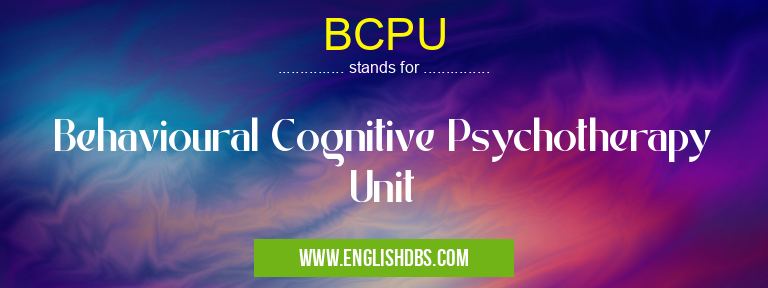What does BCPU mean in UNCLASSIFIED
BCPU stands for Behavioural Cognitive Psychotherapy Unit. It is a specialized unit within a healthcare setting that provides evidence-based psychological treatments for individuals experiencing mental health difficulties.

BCPU meaning in Unclassified in Miscellaneous
BCPU mostly used in an acronym Unclassified in Category Miscellaneous that means Behavioural Cognitive Psychotherapy Unit
Shorthand: BCPU,
Full Form: Behavioural Cognitive Psychotherapy Unit
For more information of "Behavioural Cognitive Psychotherapy Unit", see the section below.
BCPU Services
BCPUs offer a range of services, including:
- Cognitive Behavioral Therapy (CBT): A structured therapy that focuses on identifying and changing negative thought patterns and behaviors.
- Mindfulness-Based Therapies: Techniques that train individuals to focus on the present moment and reduce stress and anxiety.
- Acceptance and Commitment Therapy (ACT): A therapy that helps individuals accept their thoughts and feelings while pursuing meaningful goals.
- Psychoeducation: Providing information and support on mental health conditions and treatment options.
Benefits of BCPU
Attending a BCPU can offer several benefits, including:
- Improved mental health outcomes
- Reduced symptoms of anxiety, depression, and other mental health conditions
- Enhanced coping skills
- Improved quality of life
- Increased understanding of mental health
Eligibility for BCPU
Referral to a BCPU is typically made by a healthcare professional, such as a doctor, psychiatrist, or psychologist. Eligibility criteria may vary depending on the specific unit and the presenting mental health concerns.
Essential Questions and Answers on Behavioural Cognitive Psychotherapy Unit in "MISCELLANEOUS»UNFILED"
What is the Behavioural Cognitive Psychotherapy Unit (BCPU)?
The BCPU is a specialized unit within a mental health setting that provides evidence-based psychological therapies for individuals with a range of mental health difficulties. These therapies focus on changing unhelpful thoughts, beliefs, and behaviors that contribute to emotional and psychological distress.
What conditions does the BCPU treat?
The BCPU typically treats conditions such as anxiety disorders (e.g., obsessive-compulsive disorder, panic disorder, social anxiety disorder), depression, post-traumatic stress disorder, and personality disorders.
What types of therapy does the BCPU offer?
The BCPU offers a range of evidence-based therapies, including:
- Cognitive Behavioral Therapy (CBT)
- Dialectical Behavioral Therapy (DBT)
- Acceptance and Commitment Therapy (ACT)
- Schema Therapy
- Mindfulness-Based Therapies
Who is eligible for services from the BCPU?
Individuals who are experiencing significant mental health difficulties and who would benefit from evidence-based psychological therapy may be eligible for services from the BCPU. Referrals are typically made through mental health professionals, such as psychiatrists or psychologists.
How can I access services from the BCPU?
To access services from the BCPU, you will typically need a referral from a mental health professional. Once you have been referred, you will be assessed by a BCPU clinician to determine if you are eligible for services.
What are the benefits of receiving therapy from the BCPU?
The BCPU provides high-quality, evidence-based therapies that have been shown to be effective in reducing symptoms of mental health conditions and improving overall functioning. Therapy can help individuals develop coping mechanisms, manage their thoughts and emotions, and improve their relationships and quality of life.
Final Words: BCPUs play a vital role in providing evidence-based psychological treatments for individuals experiencing mental health difficulties. By offering a range of services tailored to specific needs, BCPUs can help improve mental health outcomes and empower individuals to manage their symptoms effectively.
